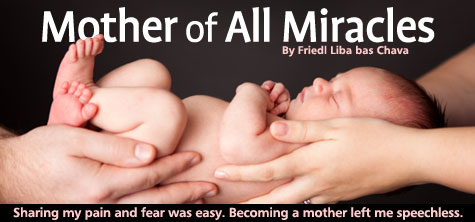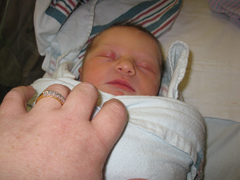 Iran’s Attack on Israel
Iran’s Attack on Israel


3 min read
4 min read
4 min read
7 min read
Sharing my pain and fear was easy. Becoming a mother left me speechless.
Silence.
There is simply overwhelming silence.
I’ve been meaning to write for months now, to share the enormous joy with all those who shared my pain and fear, to tell people that a miracle happened not so long after I last wrote – that, after three years of a new marriage, new step-motherhood, and, alas, two miscarriages, I became the mother of a healthy, sunny-natured, delicious baby girl.
After two thwarted pregnancies, this one was largely uneventful. We went with a “high risk” obstetrical practice, but it turned out that it was a routine nine months (though I — gratefully, gleefully — threw up several times a day until nearly the last month). The real risk, it seems, was the fear and apprehension that shadowed me at every moment, like background music set so low that it can barely be discerned consciously.
Related Article: Gestating Miracles
It really was likely that I was going to end up with a live baby, rather than medical bills, haywire hormones, and crumpled hopes.
It wasn’t until 30 weeks or so that it even seemed real. I was waddling around like a modestly dressed hippo and yet when one of my doctors told me that, after that point, if anything went wrong, they’d deliver the baby since it would do better out of the womb than inside, I stared at him dumbly: “You mean there’s really going to be a baby?” It really was likely that I was going to end up with a live baby, rather than medical bills, haywire hormones, and crumpled hopes.
And so, not so long ago in an American hospital room kitted out like a fancy hotel suite, I met the little girl who’d been wriggling inside me for most of a year. She was big and healthy, and incredibly alert (I fear for her teen years). I’d wondered for so long what the experience of labor would be like, and how I’d react to the momentous occasion of meeting your parents’ grandchild, the parent of your own grandchildren. Now I found out: My husband wept, and I made some crack about her looking Pakistani, which was highly unexpected, given my husband’s and my extreme Caucasian-ness. (She came out looking like Esav—red all over—but acquired the family fish-belly complexion soon enough.)
 Sleeping peacefully before
Sleeping peacefully beforeAnd there she was, in this world.
Someone holier-than-I-am had told me that the pushing part of labor is a particularly auspicious time for prayer and so, as the nurses were telling me to push, my doula was yelling, “Remember Yael! Think of Yael!” As I pushed this beautiful thing into this world, I tried (somewhat inarticulately) to concentrate on pushing something horrible out of it at the same time – the breast cancer that has attacked one of my oldest friends, a 39-year-old mother of three who lost her too-young father to another form of that disease only a few years ago.
To me, it perfectly represented this unredeemed world – the co-mingling of joy and pain; that we cannot explain why we are showered with joy at one moment and sorrow the next; why God chose that this daughter’s soul was meant to come into this world while her two siblings never were; nor why Yael and her family must, again, be tested so cruelly; why amazing, beautiful men and women suffer through unwanted singledom; why my brother’s son had to battle leukemia; why some children are born into families flush with love while others wither in families cursed with a poverty of love? My daughter carries the name shared by my great-aunt, who tried and tried but never had children, and my husband’s grandmother, who shepherded her two sons through the horrors of the Holocaust.
And so my silence.
What can I say?
We might have called her Ora for the way she poured ora v’simcha – light and happiness — into our already blessed family. We are all helpless at her chubby little feet – her parents, her grandparents, her siblings (my step-kids are the most loving siblings any mother could ever wish for her child). And yet I can’t believe I am here.
When she was a few days old, I took her on a walk. I put her in the stroller, put on a hat, and ambled around for a few blocks in the sun. At the end of the first block, it hit me – am I really here? Am I really, now, a mom?
I’d been, I liked to quip, “providing maternal services” to my step-kids for a few years now, even though I am not their mother. And it irritated me every time someone made reference to me now finally having children – but I have children, already, I felt, even if they’re not mine. And they are no less a part of my family than is my baby.
And yet, there I was – pushing a stroller, looking down at a smiling baby, and it took my breath away.
A teacher of mine, Rebbetzin Rivi Brussel, taught me that a mother is like wall around a city. But unlike city walls ringed with sentries looking for threats coming from the outside, a mother encircles her family, looking inward – looking to see who each member of the family is, what he needs to become the best version of himself.
Related Article: Season of Gratitude
Being a step-mother teaches that, however amazing your kids are, you know that they did not come—biologically—from you. So, when people compliment me on how gracious, kind, independent, and interesting my step-kids are, I usually smile and say that I had nothing to do with it – I’m just the step-mom.
It’s a blessing that takes my breath away, that defies description, even for a wordy woman like myself.
But now I see that it’s the same with this baby. Just as her siblings came to me with their own unique sets of strengths and weaknesses, charms and annoying tendencies, she came out with a sunny, funny disposition. She came somewhat implacable, hard to ruffle, and very, very communicative. I wonder at her every day. And I am reminded of my teacher’s words: My job is to watch her carefully, like I watch her siblings, and help her harness the gifts God gave her and work on the challenges He set out for her.
And this job is a clear gift. It’s a blessing that takes my breath away, that defies description (even for a wordy woman like myself), that humbles me, that makes me so aware of how incredibly blessed I am. Sure, our family faces many challenges (there’s no point listing them, but we have them in spades), but how can I not feel drenched by all this? By my husband, my step-children, my family, my daughter, our relative health…
But, somehow, I am also keenly aware of the suffering everywhere I look: Fighting cancer; marriages and families unraveling; people struggling to pay bills; loneliness; mental and physical afflictions; women and men weeping because they want desperately to be husbands and wives and mothers and fathers and God, for whatever reason, says—for now—not yet. And that’s not even getting into famine, war and the like.
So when I see images from post-tsunami Japan, or see a family struggling to stay intact, listen to a teenager tell me of her feelings of abandonment and isolation and show me the cutting marks on her arms, or hear about my neighbor trying to keep his house out of foreclosure, all I can do is reach out for my children — all of them — and hold them close, and hope that I can be worthy of my role and teach them how to live — joyfully, faithfully, righteously — in a world filled with pleasure and with pain, and to reveal the Great, Loving and Merciful God Who is too hidden from us in this world, but Whose love is overwhelming.
Frieidl Liba bas Chava would appreciate your prayers, for her and for other members of klal yisrael who need to get married or have children, and for Yael Elisheva bas Esther and her family in their fight against cancer.
